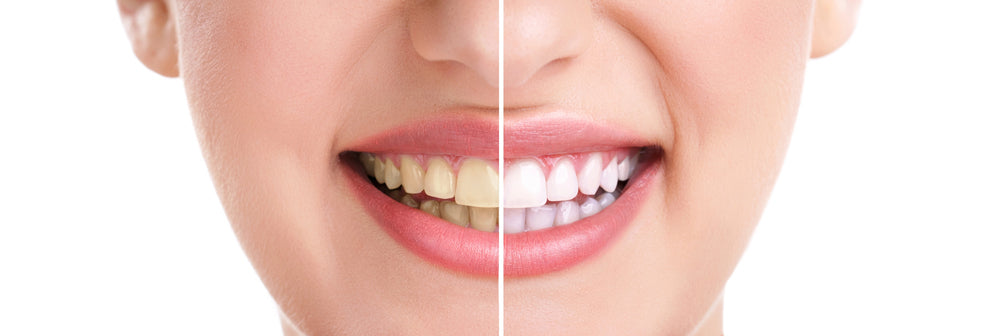
Does Milk Make Your Teeth Whiter
|
Time to read 6 min
Published on
|
Time to read 6 min
People with yellowing teeth often feel low self-confidence and are more concerned about their appearance. You are likely to be willing to try any treatment or healthy tip to whiten your teeth if you have yellowing.
Most people frequently ask about does milk make your teeth whiter. While some believe that milk can naturally whiten teeth, others believe that it does nothing more than add additional calcium to the body. This article aims to clear the confusion surrounding this question and find the correct answer to it.
Absolutely, yes. Milk is one of the best drinks between drinks that whiten teeth. Drinking milk strengthens your jawbone and can help you preserve your natural teeth for longer.
It is vital that milk be consumed by children, expectant mothers, and all women, including those who are breastfeeding; all children, from infancy to high school, require adequate calcium and phosphorus to develop their bones and teeth. For women who are post-menopausal or pre-menopausal, milk is a good defense against osteoporosis.
Find out all the details on Are your Teeth Bones?
Does Drinking Milk Strengthen Teeth?
Milk contains many nutrients that are key to strengthening teeth and protecting enamel., and healthy bones. Did you know the same nutrients we look to for strong bones are also beneficial for healthy teeth? Milk is an excellent source of protein, calcium, and essential amino acids, with many properties that are great for building strong teeth. At Great oral health , our focus is on you and your child’s healthy smile, and we’re here to make sure you have the resources to help your child achieve strong smiles for life.
Nutritional Benefits of Milk
If you are wondering does milk makes your teeth stronger, then the answer is that Milk includes many nutrients that benefit your child’s dental health. It is full of vitamins, minerals, and proteins that help your teeth and gums. These fortifying ingredients work together to fight inflammation, strengthen enamel, and lower your child’s risk of gum disease and tooth decay, resulting in a strong, healthy smile.
Beverages like red wine, cola, coffee, and black tea are some of the biggest contributors to staining the surface of the teeth. Do you aware of how does milk help whiten teeth? Testing the effect of milk on tea’s ability to stain the surface of teeth, researchers discovered that milk significantly reduced tea’s ability to darken teeth and was even more effective at protecting the color of teeth than whitening toothpaste.
You can stain your teeth with coffee, tea, red wines, and even soda. However, there are common foods that can whiten your teeth over time. Although they may not be as effective as professional whitening products, they are still affordable and easy to use.
They might stain your shirt but could help to whiten your smile. Use strawberries to mash them and rub your teeth. Let sit for five minutes, and then rinse with warm water. Then brush your teeth and floss as usual.
These nutritious fruits and vegetables act as natural stain removals by increasing saliva, which acts as the mouth's self-cleaning agent. They can also be used to kill bad breath bacteria and scrub teeth clean.
Consuming tart fruits like pineapples and oranges may increase saliva production, which can wash your teeth clean naturally. Lemons should not be applied directly to teeth as too much acidity could cause damage.
Toothpastes with baking soda do a better job of removing the plaque than toothpastes without it. You can try it by brushing with mildly abrasive toothpaste. Or you can use the baking soda right out of the box to clean your teeth every once in a while.
Does drinking milk help your teeth? Yes , Dairy products contain lactic acid, which may help protect teeth against decay. Kids who drank four times per week had less tooth decay than kids who didn't drink milk. Yogurt is also the best food for teeth. Proteins in yogurt may bind to teeth and prevent them from being attacked by harmful acids that cause cavities. Hard cheeses are best for whitening since they help remove food particles as well.
Expand your knowledge on 12 Foods that Make Your Teeth White .
Brushing your teeth right after drinking milk can be bad for your teeth because your mouth is in an acidic situation. You want to wait about 30-60 minutes before brushing so that your mouth can be less acidic. If you brush your teeth in an acidic environment, you can cause enamel erosion.
Dairy milk is great for your teeth but you should not drink it before bed. The lactose in milk is a form of sugar that promotes cavities when it is left to sit on your teeth.
You probably think of strong bones and teeth when you think of milk. We have a range of natural products for happy, healthy teeth. Our Fluoride Free Toothpaste and Oral Health Kits offer a wide range of options for improving your oral hygiene routine.
Effective bad breath remedies include:
Gentle and regular scraping of the tongue
Regular oral care practices such as daily brushing and flossing
Professional deep cleanings and plaque removal
The ongoing use of oral probiotics.
One, the probiotics compete with the existing bad bacteria and reduce their presence by “crowding them out”
Two, the probiotics produce BLIS or “bacteriocin-like-inhibitory-substances” which is a technical way of stating that one probiotic strain (bacteria) can produce a substance that inhibits or kills off other bacteria. Three, by working to control gingivitis, gum disease and tooth decay these probiotics reduce the very sources of bacteria-generated odors in the mouth.
Studies have shown a clear reduction in plaque levels and gingivitis symptoms when oral probiotics were administered to patients with moderate to severe gingivitis.